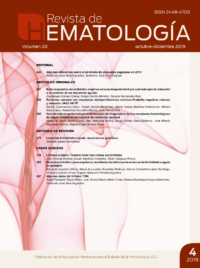Therapeutic success of empirical antibiotic in febrile neutropenia due to acute leukemia remission induction chemotherapy.
Rev Hematol Mex. 2019 octubre-diciembre;20(4):247-254. https://doi.org/10.24245/rhematol.v20i4.3077
Guadalupe Gómez-Ochoa,1 Sergio García-Méndez,2 Eleazar Hernández-Ruiz3
1 Servicio de Medicina interna.
2 Subdirección de Enseñanza e Investigación.
3 Servicio de Hematología.
Hospital Regional de Alta Especialidad de Oaxaca, Oaxaca, México.
Resumen
ANTECEDENTES: La neutropenia febril es una complicación frecuente de la quimioterapia de inducción a la remisión de leucemia aguda.
OBJETIVOS: Cuantificar el éxito terapéutico de los esquemas antimicrobianos empíricos administrados en el tratamiento de neutropenia febril de alto riesgo y de forma secundaria identificar las variables asociadas con este desenlace.
MATERIAL Y MÉTODO: Estudio observacional, analítico y retrospectivo. Evaluamos expedientes de pacientes que padecieron neutropenia febril de alto riesgo posterior a la quimioterapia de inducción a la remisión de leucemia aguda entre enero de 2007 y diciembre de 2014 en el Hospital Regional de Alta Especialidad de Oaxaca, Oaxaca, México. Se midieron variables demográficas, asociadas con la leucemia, la neutropenia febril y el tratamiento. Se hizo análisis estadístico descriptivo y correlación de Spearman.
RESULTADOS: Incluimos expedientes de 42 pacientes con diagnóstico de leucemia aguda. El éxito terapéutico se logró en 93%de los pacientes, la ceftazidima/amikacina (43%) y el imipenem (41%) fueron los antimicrobianos más prescritos y el éxito terapéutico fue semejante con ambos antibióticos (88 y 95%, respectivamente). Se documentó infección bacteriana en 20 pacientes (47.6%). Hubo correlaciones significativas (p < 0.05) entre el fracaso del tratamiento y el retraso del inicio y el escalamiento del tratamiento.
CONCLUSIONES: El éxito terapéutico global y categorizado por esquema antimicrobiano fue semejante al reportado en la bibliografía. El retraso del inicio y el escalonamiento terapéutico tienen correlación negativa con el éxito terapéutico.
PALABRAS CLAVE: Neutropenia febril; fiebre; antibiótico.
Abstract
BACKGROUND: Febrile neutropenia is a frequent complication of acute leukemia remission induction chemotherapy (ALRICh).
OBJECTIVES: To quantify the therapeutic success of the empirical antimicrobial regimens used in the treatment of high-risk febrile neutropenia and, secondarily, to identify the variables that correlate with this outcome.
MATERIAL AND METHOD: An observational, analytical and retrospective study was done evaluating the files of patients who developed high-risk febrile neutropenia after ALRICh from January 2007 to December 2014 at High Specialty Regional Hospital of Oaxaca, Mexico. Demographic, associated with leukemia, febrile neutropenia and treatment variables were measured. A descriptive statistical analysis and Spearman correlation was done.
RESULTS: Forty-two records of patients diagnosed with acute leukemia were included. The therapeutic success occurred in 93%of the patients, ceftazidime/amikacin (43%) and imipenem (41%) were the most prescribed antimicrobials and the therapeutic success was similar for both antibiotics (88 and 95%, respectively). Bacterial infection was documented in 20 patients (47.6%). There were significant correlations (p < 0.05) with the delay of onset and with the escalation of treatment for treatment failure.
CONCLUSIONS: The global and categorized therapeutic success by antimicrobial regimen was similar to that reported in the literature. Delayed onset and therapeutic staging correlate negatively with therapeutic success.
KEYWORDS: Febrile neutropenia; Fever; Antibiotic.

